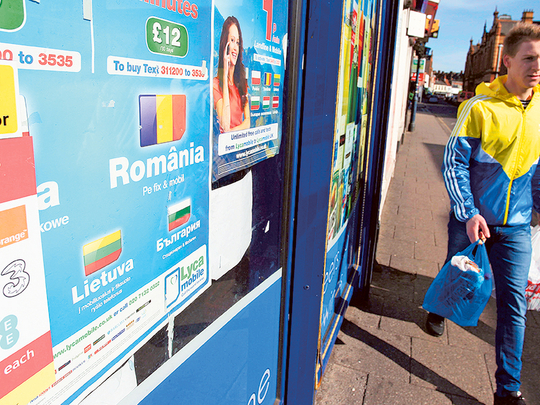
Boston, United Kingdom: For centuries the town of Boston in eastern England saw its inhabitants emigrate around the world, notably lending the name of their hometown to the city in the US state of Massachusetts.
But for the last 10 years the flow has reversed, and the tensions caused by an influx of immigrants is driving debate ahead of Britain’s May 7 general election.
Since the enlargement of the European Union in 2004, Boston has seen the arrival of Poles, Latvians and Lithuanians.
Between 2001 and the last census in 2011, its foreign-born population increased 467 per cent — the largest increase anywhere in Britain — to reach 15 per cent of the population.
“I think Boston is feeling quite depressed at the moment,” said school inspector Anna Lailey de Ville, 57.
“We have so many migrant workers here and really there’s not enough housing, not enough school places, not enough places in the hospitals and I think the government hasn’t really thought about this too carefully.”
Shops on one of the town’s main streets are packed with eastern European produce and odd-jobs advertised on noticeboards are more often written in Latvian or Polish than in English.
Lailey de Ville predicted that many Boston residents would vote for the anti-immigration UK Independence Party (Ukip) “out of anger” in next month’s vote.
The parliamentary constituency of Boston and Skegness is currently held by Prime Minister David Cameron’s Conservatives, but Ukip is winning support with its promise to leave the EU as the only way to reduce immigration.
John Gardner, 59, is among those torn between the two parties, saying that immigration has put a “strain on our resources”.
“My daughter works in a hospital, my son is a teacher and they tell me about the amount of foreign students, foreign patients and it’s just making life harder for them,” he said.
In some local schools, it is hard to find more than one child who speaks English as their mother tongue, presenting a real challenge for teachers, Lailey de Ville said.
Conservative local councillor Mike Gilbert said the area has taken in more immigrants than it can cope with.
He argues the influx is driven in part by Britain’s relatively generous welfare state, and notes his party has promised to clamp down on benefits for EU migrants.
“They are just making a rational choice by coming to Boston,” he said, listing off benefits such as housing assistance, individual child payments, and access to free health care and education.
“When you put that package together, why wouldn’t somebody come?”
But he acknowledges the workers also come because of a demand for flexible labour in Lincolnshire, a farming heartland in eastern England.
Many immigrants work as field hands and food processing workers; low-paid, low-skilled jobs that keep the local economy going.
There are complaints that the workers cram into accommodation and have helped increase rent prices.
More strident has been anti-immigration activist Dean Everitt, who complained about being a “foreigner in my own country”.
“I live in England, I am an English person, I expect to be able to speak English in my own country, not have to learn Polish or Latvian to work in the local factory,” he said.
He complained that the new arrivals were not even contributing to the economy, shopping at eastern European grocery shops which imported their products and then sent the profits to relatives back home.
Most of the immigrants out on West Street, one of Boston’s main shopping streets, declined to discuss the criticism, often citing their poor English.
But Anna, a 30-year-old Polish woman who works as a translator, said more and more of her compatriots were making an effort to integrate, notably by taking English language courses.
EU migrants are net contributors to the economy, according to several studies, including one by University College London that said they have brought £20 billion (Dh108.8 billion) to British coffers over the past decade.
And not everyone is unhappy with the new arrivals in Boston.
“Every shop around the corner has a different nationality — brilliant. Let’s eat the different food, meet the different people,” said pensioner Graham Scarborough.
“If it wasn’t for them, more than half of the shops in West Street would be empty,” added Richard Goodwin, 64. “From that point of view, they are doing us a favour.”












